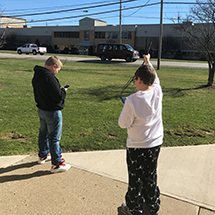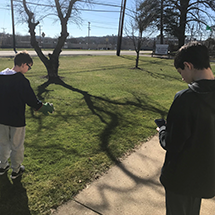People - GLOBE Observer
Mr. Gary Popiolkowski
Where are you from?
I live in Canonsburg, PA but I teach in Houston, PA. I attended the school I teach at and went to California University of Pennsylvania.

I teach 7th grade science at Chartiers-Houston Jr./Sr. High School in Houston, PA. I’ve been blessed as this is my 44th year of teaching the same grade at the same school. I have been associated with GLOBE since 1995 and S’COOL (Student Cloud Observation Online) since 2000. In 2004 I was selected for the Middle Level Educator Award for Carnegie Science Center Award for Excellence. Over the years, I have been involved with many field tests and pilots for Cornell Lab of Ornithology Classroom Feederwatch, National Geographic, Challenger Distance Learning Project from Wheeling Jesuit College and NASA, American Geological Institute CUES curriculum, and BSCS/GLOBE Weather Unit. I was able to attend the Geoscience Teachers Academy from American Geological Institute and have presented at national and regional NSTA conferences on Problem Based Learning for the past 9 years. In 2016 I was honored to be named a GLOBE Distinguished Educator Fellow and recently became an Apple Teacher.
We have taken many measurements for GLOBE over the years and recently have used the Automated Weather System to send in measurements. Our students have been involved with the Field Temperature Campaign for years. In 2013 we took 3rd place in the North American Division of GLOBE Virtual Student Conference which afforded my students and me the opportunity to present at the 17th annual GLOBE conference. The students are responsible every period to do cloud observations and upload the results and currently have taken over 15,000 cloud observations since joining S’COOL. Last year we raised Monarch Butterflies to release and used Journey North to investigate their incredible story and journey.
Every year we study our local watershed that our school is on to check its health. We study the stream, wetlands, and wooded area by running tests and identifying invasive species and native species.
How do you use GLOBE Observer?
My students use iPads and their iPhones with the GLOBE Observer app while at school to take and upload our cloud measurements.

We plan on continuing to take cloud measurements by the hour in order that each period can participate in the collection/identification. We will also continue to take cloud measurements over the summer as we have for the past years using our student volunteers.
Why is citizen science important to you?
It is my goal to excite students about what is around them, as I tell them when we are outside exploring, “Look up, look down, and look around”. Too many times they miss the cool and interesting things that are out there. So being a citizen scientist helps them enjoy these wonderful gifts and realize we can make a difference.
What advice do you have for people just getting into citizen science?
I would begin small so that it would not be overwhelming. I have also divided the protocols among groups of students who then become “experts” just in that particular parameter. Then they will teach the other students throughout the year.
What do you do for fun?
I love playing and messing around with our 4 and soon to be 5 grandkids all under the age of 6. I also love to read, fish, take daily walks with my wife and update daily on Facebook our Pop’s Kids Positive Posts.
What inspires you?
First, my wife. She has always encouraged me to continue my education in the summers even though it may take me away for periods of time. Next, my colleagues and administrators form a terrific team that is dedicated to push and challenge our students in the middle school. And last, the students who really dive into and can’t wait to ask questions to go further into the topics we cover instead of being satisfied with Google answers.
Any favorite quotes that you would like to share?
"Too often we give children answers to remember rather than problems to solve.” Roger Lewin
"Trying, failing and trying again is called learning" Cloud & Townsend








